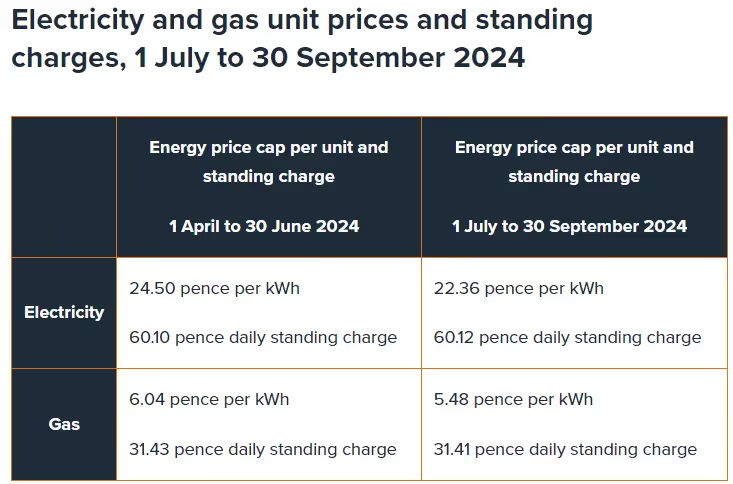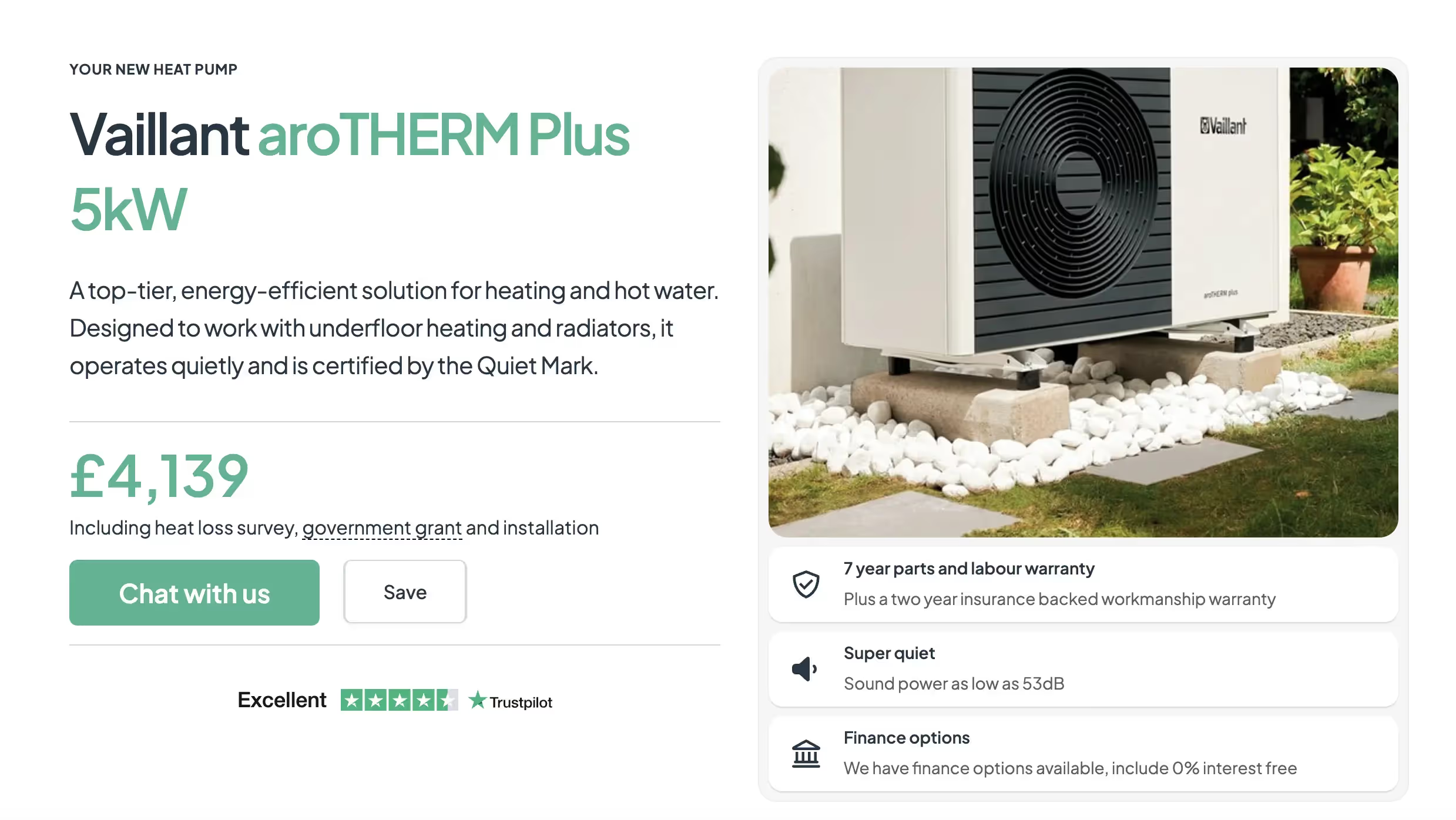
This guide explaining heat pump running costs is a detailed one. If you’ve not got the time to read the whole article, bookmark this page for later and read this condensed summary instead…
The average cost of running a heat pump will sit in the range of £800-£2,500 annually, or £67-£208 per month. This is comparable to the price of a reasonably efficient gas boiler and cheaper than old inefficient boilers, especially those using oil.
Assuming you have no other gas appliances, you’ll remove the need for a gas standing charge, offering some small savings.
Pinpointing the exact running costs for heat pumps isn’t easy, as each property has different heating and hot water demand. But some of the biggest factors that will determine the exact cost to run your air source heat pump (ASHP) include:
Installing a heat pump is a big financial decision. We’ve got a few resources that can help you decide if switching to an eco-friendly heat pump is suitable, as well as determining if you’re eligible for government grants (worth up to £7,500):
An average air source heat pump is likely to cost anywhere from £800-£2,500 per year to run which equates to £67-£208 per month.
Unlike a gas boiler, these figures relate directly to your electricity bills (heat pumps don’t use gas). But like a gas boiler, the big potential range in running costs comes down to dozens of variables, including the size of your home and efficiency of your radiators.
Using kWh outputs for both gas boilers and heat pumps, you could work out the per hour cost for each. However, this assumes that they’d be working absolutely flat out during that time. As neither appliances usually work at maximum capacity, this comparison wouldn’t be a true representation of hourly, daily or monthly running costs.
Once you’ve paid for your air source heat pump to be installed, the running costs are limited to annual maintenance and the cost of electricity.
Heating systems using air source heat pumps can be coupled with solar panels. If you have sufficient battery storage and a big enough solar panel system, you could eliminate the cost of electricity completely. This could lead to running cost savings of thousands of pounds each year.
We fit air source heat pumps with the majority of the installation cost covered by ECO government grants. Alongside this, we can bolt on a solar panel installation package to suit.

Simply use our clickable heat pump form, and once you’ve chosen the most suitable pump, click the “Add a solar panel system” option.
Electricity prices play a huge role in exactly how much an air source heat pump costs to run. Using the current energy price cap (1 July to 30 September 2024), you’ll be paying 22.36p per kWh of electricity.
Remember energy price caps regularly change (both up and down).
The size of your property is one of the biggest factors when it comes to an air source heat pump’s running cost. A small 2-bedroom flat is going to have a lot less heating demand than say, a 3-4 bedroom detached property.
But, alongside the size of the property, the amount of people regularly inhabiting the space, the amount of radiators, taps and showers all make a big difference too.
Cavity wall insulation and loft insulation of any kind will help reduce the running costs of an air source heat pump. However, the better this insulation is, the bigger the reduction in overall running costs for your ASHP.
If you live in an old property with little or no insulation, it would benefit from being insulated before installing an ASHP system.
You’ll see that most installers fitting air source heat pumps suggest upgrading radiators. Old radiators are incredibly inefficient, which is one of the reasons for the recommendation.
An air source heat pump works differently to a heating setup with a gas boiler. To achieve high energy efficiency ratings, air source heat pumps work “low and slow”, rather than firing at maximum capacity.
It’s likely your current radiators won’t have the capacity to keep your house heated. If you have small and inefficient radiators, upgrading to larger and more efficient radiators is going to help reduce your electricity bills and overall running costs dramatically.
If you’re switching from a gas boiler to an air source heat pump, assuming you have no other gas appliances, you’ll make a saving in the form of a gas standing charge.

As you can see from the Ofgem energy price cap here, the current standing charge for gas is 31.41p. It’s a small saving, but savings all add up and help to reduce the overall running cost of your air source heat pump.
Underfloor heating works in a similar way to an air source heat pump, it works best when it’s running low, slow and consistently. Coupling an air source heat pump with an underfloor heating system is a great way to bump up efficiency.
Essentially, if two comparable properties were using an air source heat pump, the one using underfloor heating would be much more energy efficient. And that’s going to mean electricity consumption is reduced, as is the overall cost of running their air source heat pump.
To get an accurate picture of whether a heat pump is cheaper to run than a gas boiler, we’d need to dissect property size, hot water demand, heating demand and more.
In general, expect the running cost of a gas boiler to be similar to an air source heat pump.
Whilst electricity is over 3 times the price of gas, air source heat pumps are usually over 3 times the efficiency of a gas boiler.
Assuming you’re using an efficient gas boiler, running costs for a heat pump would be comparable. If you use an old and inefficient boiler (especially if it’s oil), a heat pump is likely to represent a huge monthly cost saving on your energy bills.
The installation cost of a gas boiler is much cheaper than an air source heat pump. However, they are comparable in cost if you’re able to utilise government grants for an ASHP installation.
A typical combi gas boiler will cost around £2,500-3,000 to install. You can read our guide to boiler installation costs here.
By contrast, you’ll pay around £10,000-£13000 for the average ASHP installation. You can read our air source heat pump installation cost guide here.
Based on installation costs alone, gas boilers are generally cheaper. However, as you can see from the fixed price we got using our clickable tool here, the gas boiler doesn’t qualify for a government grant (up to £7,500) and the air source heat pump installation does.

There are plenty of ways to reduce electricity consumption and overall heat pump running costs. We’ve mentioned some above including upgrading radiators, insulation and even fitting solar panels.
However, the best way to keep the cost of running your heat pump as low as possible, is regular maintenance. Heat pumps use filters, which over time get clogged. A clogged or blocked filter is going to restrict flow and cause your heat pump to run inefficiently, increasing electricity consumption.
Typically, you should schedule a service for your heat pump at least once a year. A heat pump service will include replacing or cleaning the filter and will help to reduce running costs.
Try our free quote tool. You'll have your personalised quote in under a minute.